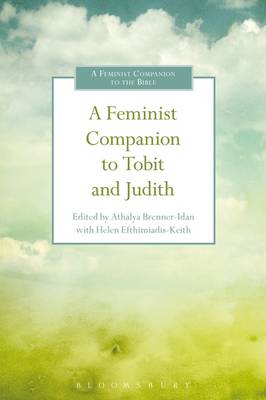14%OFF

Stock image for illustration purposes only - book cover, edition or condition may vary.
A Feminist Companion to Tobit and Judith
A Brenner-Idan
€ 34.99
€ 30.23
FREE Delivery in Ireland
Description for A Feminist Companion to Tobit and Judith
Paperback. Editor(s): Brenner-Idan, Athalya; Efthimiadis-Keith, Helen. Series: Feminist Companion to the Bible. Num Pages: 304 pages. BIC Classification: HRCG3; JFFK. Category: (P) Professional & Vocational. Dimension: 159 x 234 x 18. Weight in Grams: 520.
A Feminist Companion to Tobit and Judith extends the work of the hugely influential and respected Feminist Companion series, which continues to set the standard for feminist approaches to the Hebrew Bible and related texts. In the present volume Athalya Brenner-Idan (with Helen Efthimiadis-Keith) draws together a range of scholarly commentators and addresses the core issues relating to feminist interpretations of the two texts at hand. The volume examines attitudes to gender, identities, exile, social mores, beliefs, clothing, food and drink, personal relationships, and biblical reception. The contributors are: Beverly Bow and George Nickelsburg, Athalya Brenner-Idan, Ora Brison, Helen Efthimiadis-Keith, Renate Egger-Wenzel, Beate Ego, Emma England, Jennifer Glancy, Jan Willem van Henten, Naomi Jacobs, Amy-Jill Levine, Pamela Milne, and Barbara Schmitz.
Product Details
Publisher
Bloomsbury Publishing PLC
Format
Paperback
Publication date
2015
Series
Feminist Companion to the Bible
Condition
New
Number of Pages
304
Place of Publication
Edinburgh, United Kingdom
ISBN
9780567656018
SKU
V9780567656018
Shipping Time
Usually ships in 5 to 9 working days
Ref
99-1
About A Brenner-Idan
Athalya Brenner-Idan is Professor Emerita of Hebrew Bible at the University of Amsterdam, the Netherlands, and is now Professor in Biblical Studies at the University of Tel Aviv, Israel. Helen Efthimiadis-Keith teaches Hebrew Bible at the University of KwaZulu-Natal, South Africa.
Reviews for A Feminist Companion to Tobit and Judith
This collection of essays on the books of Tobit and Judith is a welcome addition to a landmark series that has put feminist criticism prominently on the map of biblical studies. It is a significant addition as well because it is the first time Tobit appears in the Feminist Companion Series. The combination of new and previously published studies-the latter either revised or accompanied by the authors' self-responses to their earlier work (and in one case a response by Brenner-Idan)-works splendidly to give readers a sense of developments in feminist studies of Tobit and Judith. With its focus on identity-religious, gendered, individual or group, its formation or loss-and related topics such as diaspora, boundaries, the body, and food as an identity marker, this volume is relevant for the study not only of Tobit and Judith but of other biblical books as well.
J. Cheryl Exum, University of Sheffield, UK
An international treasure trove of articles some first published twenty years ago are here coupled with previously published essays and new essays on Judith and Tobit. What is being suggested here is programmatic counsel about radical, transformative, phase-shift change in our understanding of biblical studies. When Judith says, let us set an example for the people (Jdt 8:24) to the magistrates of Bethulia, they don't get it, but perhaps we can. Patriarchy still exists, but along side it something new is emerging-a network of shared agency and identity (heterarchy). This book is highly recommended for classes on Tobit and Judith or methodology.
Toni Craven, Texas Christian University, USA
J. Cheryl Exum, University of Sheffield, UK
An international treasure trove of articles some first published twenty years ago are here coupled with previously published essays and new essays on Judith and Tobit. What is being suggested here is programmatic counsel about radical, transformative, phase-shift change in our understanding of biblical studies. When Judith says, let us set an example for the people (Jdt 8:24) to the magistrates of Bethulia, they don't get it, but perhaps we can. Patriarchy still exists, but along side it something new is emerging-a network of shared agency and identity (heterarchy). This book is highly recommended for classes on Tobit and Judith or methodology.
Toni Craven, Texas Christian University, USA
